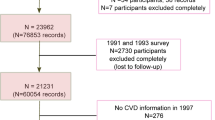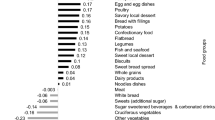Abstract
Objectives: To examine the influence of education and marital status on dietary intake, body mass index, waist hip ratio, blood pressure, fasting and 2 h glucose, and lipid profile in adult Hong Kong Chinese.
Design: Randomized age and sex stratified survery
Subjects: One thousand and ten subjects aged 25–74 y (500 men, 510 women) recruited for the 1995–96 Hong Kong Dietary and Cardiovascular Risk Prevalence Survey.
Measurements: Dietary intake was estimated using a food frequency method. Information on education level and marital status was included in the questionnaire. Anthropometry and biochemical parameters were measured using standard methods.
Results: After adjustment for age, higher levels of education are associated with higher percentage protein intake in men, higher percentage fat intake in women, higher nutrient density of fibre and calcium in both men and women, and higher nutrient density of protein, fat, niacin, vitamin D, and polyunsaturated fatty acid in women. Consumption of fruits was also higher in women, and that of dairy products higher in men. Body mass index and waist-hip ratio were lower with increasing levels of education in women, while lower mean systolic BP was observed in men. Single women had lower nutrient densities of vitamin D and iron, and lower consumption of vegetables and fish, compared with married women. Body mass index was lower in both single men and women. Single men had a better cardiovascular risk factor profile, in that diastolic BP, triglycerides and cholesterol/HDL ratio were lower, in addition to a lower body mass index.
Conclusion: Higher education level is associated with a healthier diet and lower prevalence of overweight.
Sponsorship: Hong Kong Health Services Research Grant.
This is a preview of subscription content, access via your institution
Access options
Subscribe to this journal
Receive 12 print issues and online access
$259.00 per year
only $21.58 per issue
Buy this article
- Purchase on Springer Link
- Instant access to full article PDF
Prices may be subject to local taxes which are calculated during checkout
Similar content being viewed by others
Author information
Authors and Affiliations
Contributions
Contributions by authors: (J Woo)—Writing, planning analysis, design of study, grant apllication, running of the project. (SSD Leug)—Design of questionnaire, training of fieled workers, day to day supervision, data analysis. (SC Ho)—Design of questionnaire, data analysis. (A Sham)—Data analysis.
Rights and permissions
About this article
Cite this article
Woo, J., Leung, S., Ho, S. et al. Influence of educational level and marital status on dietary intake, obesity and other cardiovascular risk factors in a Hong Kong Chinese population. Eur J Clin Nutr 53, 461–467 (1999). https://doi.org/10.1038/sj.ejcn.1600777
Received:
Revised:
Accepted:
Published:
Issue Date:
DOI: https://doi.org/10.1038/sj.ejcn.1600777
Keywords
This article is cited by
-
Opposite associations of household income with adolescent body mass index according to migrant status: Hong Kong’s “Children of 1997” birth cohort
International Journal of Obesity (2018)
-
Relationship between coping styles and lipid profile among public university staff
Lipids in Health and Disease (2017)
-
Relationship between health behaviour and body mass index in the Serbian adult population: data from National Health Survey 2013
International Journal of Public Health (2016)
-
The Effect of Socioeconomic Position on Bone Health Among Koreans by Gender and Menopausal Status
Calcified Tissue International (2012)
-
Modifiable cardiovascular risk factors among adults in Aleppo, Syria
International Journal of Public Health (2011)



